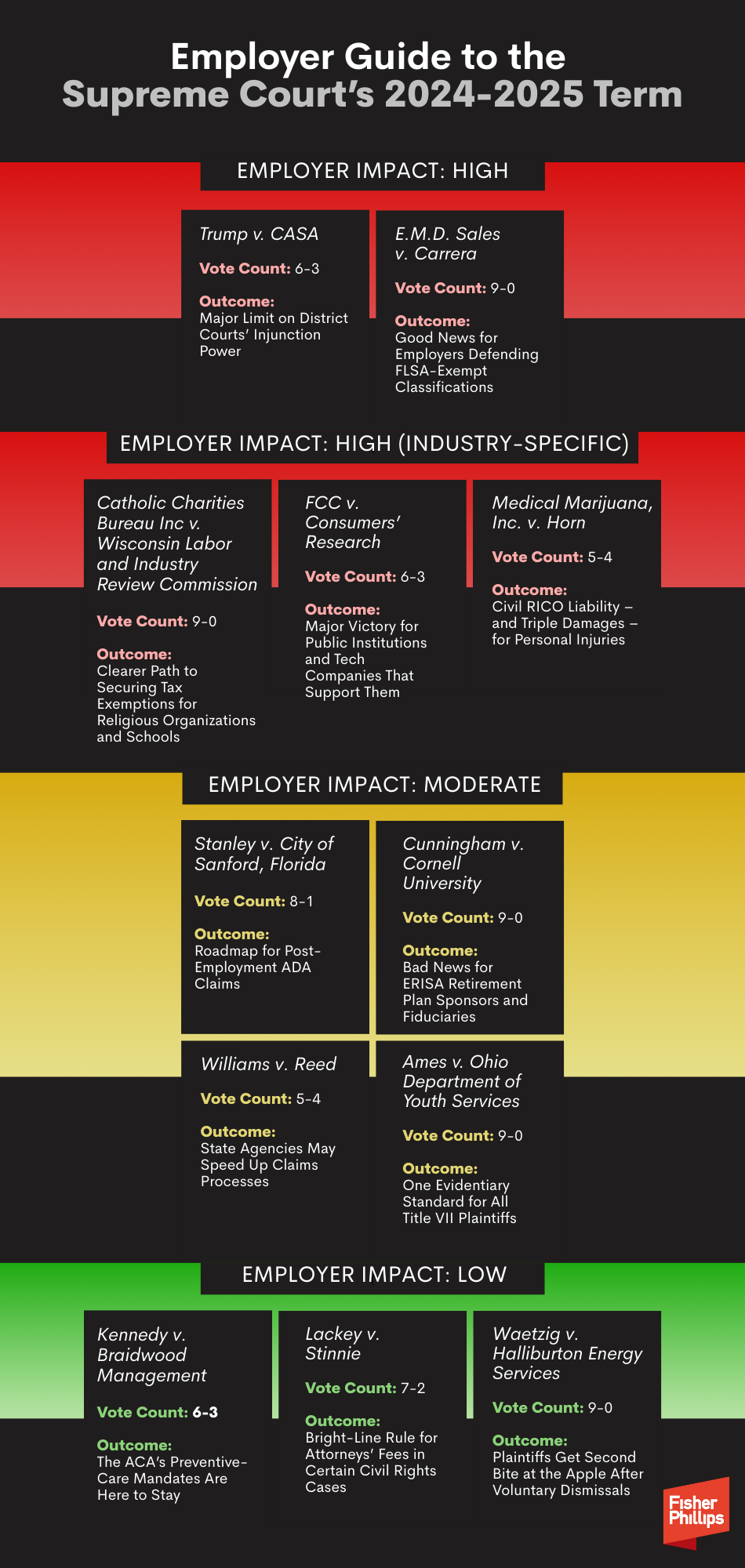As the Supreme Court prepares for its next term to begin October 6, let’s look back on all the SCOTUS cases from the past year that impacted your workplace, industry, and litigation exposure. Here’s a quick guide to 12 times this year that four small words – it is so ordered – created sweeping implications for your business, along with a rating for how impactful each decision will be for employers.
|
Note: We’ll be publishing a preview of the 2025-2026 SCOTUS term in the first week of October. Make sure you’re subscribed to Fisher Phillips’ Insight Systems to ensure you get it delivered to your inbox. |
1. Major Limit on District Courts’ Injunction Power
- Case: Trump v. CASA (June 27, 2025)
- Vote Count: 6-3
- Ruling: Federal district court judges may not issue injunctions that are broader than necessary to provide complete relief to each plaintiff with standing to sue.
- Employer Impact Score: High
- Employer Impact: Plaintiffs will now have a much harder time obtaining so-called “universal” injunctions to block federal executive orders and agency actions that they oppose. Such coast-to-coast injunctions had frequently stalled workplace-related policies for both Republican and Democratic administrations and put employers in the in the crossfire of sweeping federal policies halted (or enforced) by federal courts.
2. One Evidentiary Standard for All Title VII Plaintiffs
- Case: Ames v. Ohio Department of Youth Services (June 5, 2025)
- Vote Count: 9-0
- Ruling: Title VII of the Civil Rights Act of 1964 does not require “majority-group” plaintiffs to meet a higher evidentiary standard compared to minority-group plaintiffs.
- Employer Impact Score: Moderate
- Employer Impact: While this decision has implications for employers nationwide, we don’t expect discrimination claims from majority-group members to suddenly skyrocket. However, employers may see a slight uptick in such claims – especially those that operate within the 6th, 7th, 8th, 10th, and D.C. Circuits (Arkansas, Colorado, D.C., Illinois, Indiana, Iowa, Kansas, Kentucky, Michigan, Minnesota, Missouri, Nebraska, New Mexico, North Dakota, Ohio, Oklahoma, South Dakota, Tennessee, Utah, Wisconsin, and Wyoming), given that the bar for bringing such claims has been lowered in these jurisdictions.
3. Roadmap for Post-Employment ADA Claims
- Case: Stanley v. City of Sanford, Florida (June 20, 2025)
- Vote Count: 8-1
- Ruling: Former employees cannot prevail on claims under the Americans with Disabilities Act – unless they can plead and prove that they held or desired a job, and could perform its essential functions with or without reasonable accommodations, at the time of an employer’s alleged act of disability-based discrimination.
- Employer Impact Score: Moderate
- Employer Impact: While this ruling significantly restricts who can succeed on post-employment ADA claims and when they may do so, the Court made it clear that such claims can prevail under certain circumstances, even if the plaintiff is retired or no longer employed at the time they file suit.
4. Good News for Employers Defending FLSA-Exempt Classifications
- Case: E.M.D. Sales v. Carrera (January 15, 2025)
- Vote Count: 9-0
- Ruling: The “preponderance of the evidence” standard applies when an employer needs to prove it correctly classified employees as exempt from the minimum wage and overtime pay requirements under the Fair Labor Standards Act.
- Employer Impact Score: High
- Employer Impact: This ruling will reduce litigation risks by making it easier for employers to show that they have properly classified employees for FLSA purposes. Misclassifying employees based on their exemption status is a key compliance issue, and, when exempt status is challenged, the employer has the burden of proving why the default status of non-exempt does not apply.
5. Bad News for ERISA Retirement Plan Sponsors and Fiduciaries
- Case: Cunningham v. Cornell University (April 17, 2025)
- Vote Count: 9-0
- Ruling: Plaintiffs are not required to address potential exemptions under ERISA § 408 in order for a prohibited transaction claim to make it past the motion-to-dismiss stage of litigation. Instead, plaintiffs bringing such claims need only to plausibly allege the elements under ERISA § 406.
- Employer Impact Score: Moderate
- Employer Impact: More prohibited transaction claims will survive the dismissal stage. This means that retirement plan sponsors could face a wave of new ERISA lawsuits, and fiduciary-decision making is now more vulnerable to second-guessing.
6. The ACA’s Preventive-Care Mandates Are Here to Stay
- Case: Kennedy v. Braidwood Management (June 27, 2025)
- Vote Count: 6-3
- Ruling: U.S. Preventive Services Task Force members are “inferior” officers under the Constitution’s Appointments Clause, and it is therefore constitutional for Task Force members to be appointed (or removed) by the Secretary of the Department of Health and Human Services, rather than by the president with the advice and consent of the Senate (which is required for “principal” officer appointments).
- Employer Impact Score: Low
- Employer Impact: Since the Affordable Care Act (via 42 U.S.C. § 300gg-13) requires most group health plans to fully cover preventive services that receive “A” or “B” ratings from the Task Force, the Court’s refusal to dismantle the Task Force means that insurance issuers and group health plans must continue to comply with the ACA’s preventive-care mandates (and the federal government may enforce them). However, because SCOTUS determined that Task Force members are inferior officers supervised and directed by the HHS Secretary, the Task Force could now be subject to greater political influence.
7. Bright-Line Rule for Attorneys’ Fees in Certain Civil Rights Cases
- Case: Lackey v. Stinnie (February 25, 2025)
- Vote Count: 7-2
- Ruling: A party “prevails” under a federal fee-shifting statute (42 U.S.C. § 1988(b)) only when a court “conclusively resolves his claim by granting enduring relief on the merits that alters the legal relationship between the parties.” (This case involved a federal civil rights claim challenging the constitutionality of a Virginia state law unrelated to the workplace).
- Employer Impact Score: Low
- Employer Impact: On one hand, this decision could help employers by making it harder for plaintiffs to recover attorneys’ fees in cases involving workplace laws with similar fee-shifting provisions (such as, if courts apply a similar “prevailing party” interpretation to such laws). On the other hand, employers would be limited in their ability to recover fees in their lawsuits challenging state regulations, and plaintiffs might now be incentivized to manipulate fee liability by seeking to litigate a case to final judgment after obtaining the relief they need, just to secure a fee award.
8. Plaintiffs Get Second Bite at the Apple After Voluntary Dismissals
- Case: Waetzig v. Halliburton Energy Services (February 26, 2025)
- Vote Count: 9-0
- Ruling: A voluntary dismissal counts as a “final proceeding” under Federal Rule of Civil Procedure 60(b), allowing federal courts to reopen cases in certain circumstances.
- Employer Impact Score: Low
- Employer Impact: This ruling alters the litigation landscape for employers by making it easier for employees to revive lawsuits they voluntarily dismissed. However, it’s hard to predict how often plaintiffs will be able to take advantage of this new pathway – and whether lower courts will add additional contours to the new standard.
|
Read more: SCOTUS Ruling Expands Path for Plaintiffs to Revive Dismissed Lawsuits: What Employers Need to Know |
9. State Agencies May Speed Up Claims Processes
- Case: Williams v. Reed (February 21, 2025)
- Vote Count: 5-4
- Ruling: State courts may not apply a state exhaustion requirement to deny Section 1983 claims challenging delays in the administrative process if doing so effectively immunizes state officials from such claims. SCOTUS therefore reversed an Alabama Supreme Court judgment dismissing unemployed workers’ Section 1983 due process claims alleging unlawful delay in processing state unemployment benefits (effectively immunizing the state’s Secretary of Labor from such claims).
- Employer Impact Score: Moderate
- Employer Impact: This ruling could potentially apply broadly to all state agency processes, leading to more employees seeking to side-step their state’s administrative process and bring workplace claims directly to court if they can somehow demonstrate that the state process is dragging on too long. Employers could also see faster processing of administrative claims, as state agencies look to avoid due process lawsuits.
10. Clearer Path to Securing Tax Exemptions for Religious Organizations and Schools
- Case: Catholic Charities Bureau Inc v. Wisconsin Labor and Industry Review Commission (June 5, 2025)
- Vote Count: 9-0
- Ruling: Because the First Amendment requires the government to maintain neutrality between religions, a state’s criteria for an unemployment compensation tax exemption that imposes a denominational preference by differentiating between religions based on theological practices is unconstitutional.
- Employer Impact Score: High (for religious organizations and schools)
- Employer Impact: The decision establishes that governments cannot create religious exemptions that favor some faith traditions over others based on their theological practices. This broadens the scope for religious organizations and schools to claim exemptions without altering their religious practices.
|
Read more: |
11. Major Victory for Public Institutions and Tech Companies That Support Them
- Case: FCC v. Consumers’ Research (June 27, 2025)
- Vote Count: 6-3
- Ruling: Congress did not violate the non-delegation of powers doctrine by exercising “all legislative Powers” under Article I of the Constitution and authorizing the FCC to collect contributions from telecom companies for a Universal Service Fund (USF).
- Employer Impact Score: High (for schools and tech companies)
- Employer Impact: This ruling preserves federal funding – the USF – for the E-rate program, which subsidizes telecom and internet services for low-income consumers and for schools, libraries, and hospitals in rural areas and other underserved communities.
12. Civil RICO Liability – and Triple Damages – for Personal Injuries
- Case: Medical Marijuana, Inc. v. Horn (April 2, 2025)
- Vote Count: 5-4
- Ruling: The federal Racketeer Influenced and Corrupt Organizations Act (RICO) allows plaintiffs bringing civil claims to recover damages (including triple the amount that makes them whole) for business or property loss even if the loss resulted from a personal injury. The case is now continuing to play out in the lower court, which will decide (among other things) whether a cannabis company’s alleged misrepresentations about its product containing 0% THC (the psychoactive component in cannabis) directly caused the plaintiff’s personal injury. (According to the plaintiff, he lost his job as a result of failing a workplace drug test after he unknowingly consumed THC due to the defendant’s misrepresentations).
- Employer Impact Score: High (for cannabis businesses)
- Employer Impact: This decision not only serves as a wake-up call for businesses in the cannabis industry given the steep damages at stake but also impacts business across all industries by potentially opening the door for plaintiffs to bring RICO claims and seek triple damages for business or property losses that stem from what is typically a state tort personal injury claim. However, SCOTUS noted limits. Justice Barrett gave the example of a gas station owner who is beaten in a robbery. While he cannot recover for pain and suffering under RICO, he can recover for the loss of the business if injuries from the robbery force him to shut his doors.
What’s Next?
The Supreme Court’s 2025-2026 term begins on October 6. We will be monitoring the docket and tracking workplace law and industry-specific issues taken up by SCOTUS.
Make sure you’re subscribed to Fisher Phillips’ Insight Systems so you receive our term preview and case alerts as decisions are handed down.




